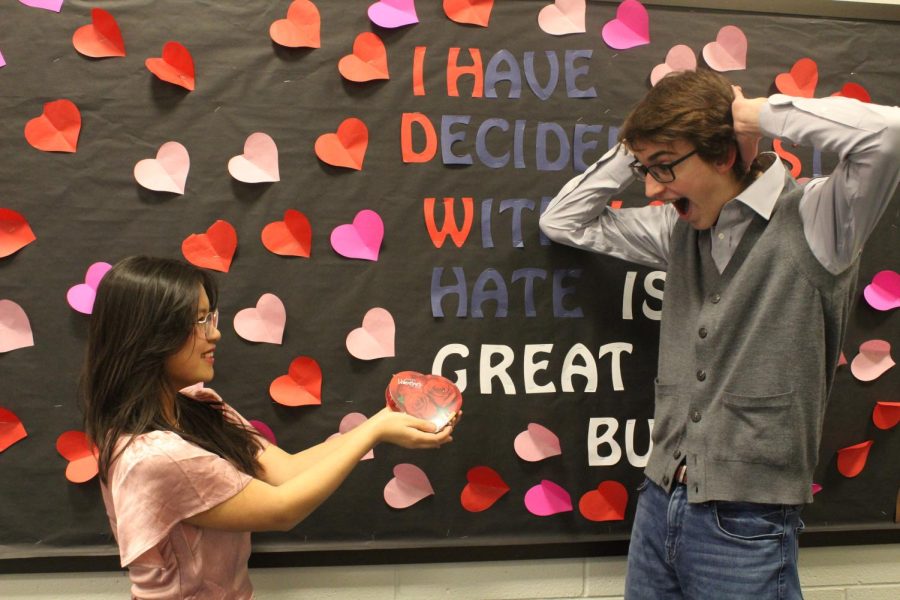Valentine’s Day: Not As Bad As You Think
Valentine’s Day gives couples a special day to show how much they care about each other. Everette Alhambra, freshman, and Lincoln Pixton, freshman.
February 10, 2023
Valentine’s Day is a holiday with complex origins. Three different Catholic saints are credited with being the mysterious name of the holiday. Valentine’s Day is often compared to the Roman festival of Lupercalia, which Pope Gelasius merged with Valentine’s Day to try to stamp out paganism.
By the middle ages, Valentine’s Day had slowly gained popularity as it became known as a celebration of love. The oldest record of a written Valentine was a poem written by a French Duke in 1415.
Today, Valentine’s Day gets a lot of hate. Many of the people I have met describe it as one of the absolute worst holidays. They say it is fueled by consumerism and that it is all meaningless.
But there is something strange about these criticisms of Valentine’s Day; they also apply to just about every other holiday.
While it certainly is true that corporations use Valentine’s Day to manipulate people into buying their products, with consumers predicted to spend almost $26 billion on the holiday this year, it is also abundantly clear that many other holidays are exploited even more by business.
Hundreds of billions of dollars are spent by consumers every Christmas, with many spending significant portions of their income on gifts. The money people spend on their significant others on Feb. 14 is a drop in the ocean compared to what they likely just spent on gifts for their entire family. Over $10 billion is spent on Halloween every year, a holiday that does not even require gifts.
Consumerism and corporate greed are not issues specific to Valentine’s Day. They infest nearly every single major holiday in our nation for the simple reason that it is easy to convince people to buy things for any holiday. If you take issue with Valentine’s Day because of this, you should take issue with many more holidays as well.
Another common criticism of Valentine’s Day is that supposedly its romantic gestures are meaningless because they are expected.
You are expected to give your friends and family gifts on Christmas. You are expected to honor fallen veterans on Memorial Day and thank those that are still living on Veterans Day. You are expected to eat dinner with your relatives on Thanksgiving.
Does the expectation make any of those things less special? Less meaningful? No one in my family has ever rejected a gift from me because I gave it to them on Christmas. I have never been chastised by a veteran for thanking them for their service on Veterans Day instead of a different day.
Sure, these practices lack spontaneity, but they are still declarations of appreciation for others in the same way that Valentine’s Day gifts are declarations of love. People are still genuinely touched by receiving them.
Along with the expectations of Valentine’s Day comes the incredible meaning of going above and beyond.
The consensus seems to be that people should buy flowers or chocolates for their significant other, exchange other stereotypical romantic gifts and then get dinner at a fancy restaurant. But people don’t have to follow this formula, and it shows just how much you care when you break it to do something your partner truly enjoys.
Valentine’s Day provides a unique opportunity where you can show their significant other how much effort you are willing to put in to make a day that is technically about every couple in the world be just about the two of you.
It’s clear that this idea has found its way into the mainstream, with an abundance of recommendations for unconventional or interesting Valentine’s Day dates available online. People are seeking unique things to do with their partners and strengthening their relationships by doing this.
Many of these unconventional dates are twists on the more traditional choices that provide more personal moments. Instead of going to a fancy restaurant, you could cook your Valentine a family recipe or even the cooking itself could be the date as you and your partner work together to make a meal.
If regular movie theaters are too run-of-the-mill for you, sweep your significant other off their feet with a trip to a local theater to see their new play or find a live band playing at a restaurant to enjoy.
Many couples also completely abandon tradition for their Valentine’s Day plans. Volunteering together is a great way for couples to help their communities while also celebrating their love. Exploring the community together can let couples learn about themselves and others.
For those who are single, Valentine’s Day can still be fun. For one, it may provide that push for them to ask out that special someone and who knows, it might just work out.
There is also always the choice of spending some quality time with your friends. Much of this year’s predicted increase in Valentine’s Day spending is credited to gifts for pets, friends, coworkers and others. While Valentine’s Day as a whole focuses on romantic love, this does not mean your Valentine’s Day has to. People have the option to celebrate with friends to show them how much they care.




